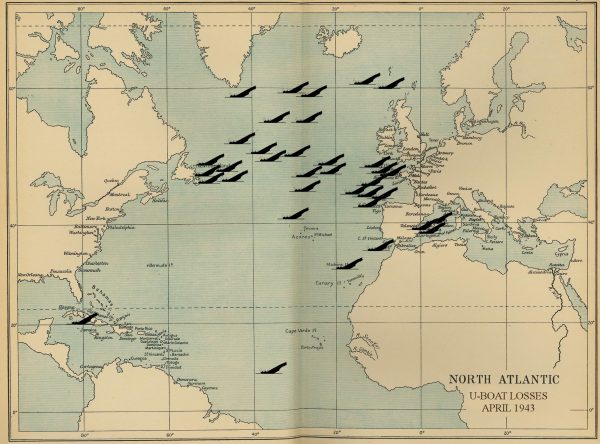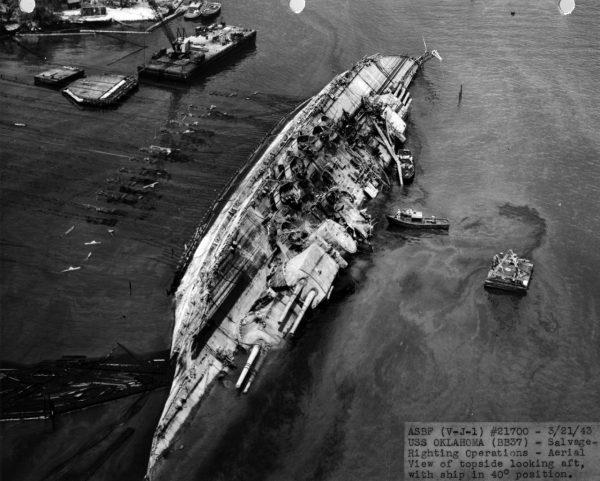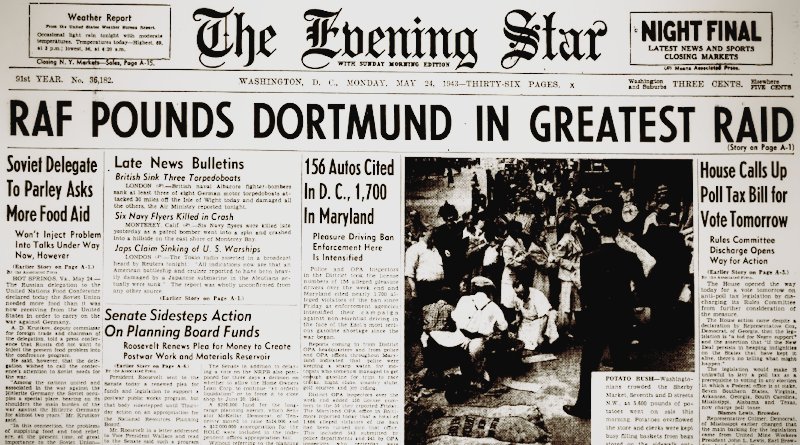World War II Chronicle: May 24, 1943
Click here for TODAY’S NEWSPAPER
This month has been an absolute massacre for Germany’s U-boat fleet.

The map does not account for two subs that collided with each other and sunk, one that was just never heard from again, another that went missing after being damaged by a British B-17 attack, and three sunk in the harbor during the American bombing raid on May 14th — these will likely be raised…

On page eight: The 101st Infantry Battalion, a U.S. Army provisional Austrian unit which lists two archdukes and one of the members of the Von Trapp Family (from the musical The Sound of Music), could not find enough recruits and will be disbanded… Sports section begins on page 14.
Roving Reporter by Ernie Pyle
NORTHERN TUNISIA — (By Wireless) — This column has three heroes, if you want to call them that. They are the three men who commanded, one after the other, the same infantry company — all within five hours of battle. For lack of a better name we’ll simply call it Company K.
It was daytime. The whole company was pinned down on a green wheat field that led up onto the slope of a hill. We were trying to take the Germans on the back slope of the hill, but from the ridge they could butcher our men below their machine guns if they stirred.
Lt. Richard Cole, of Worcester, Mass., was commander of Company K. In mid-afternoon a German shell found him as he lay in hiding with his men in the wheat. One leg got only a slight wound, but the other was shattered.
Lieutenant Cole saved his life by using his head. He made a tourniquet of his handkerchief, and using a fountain pen for a lever he twisted the tourniquet and held it, and at the same time began slowly crawling to the rear. For he knew the medics didn’t dare to venture onto the shell-raked field looking for possible wounded.
After about an hour he loosened the tourniquet, to prevent gangrene. Darkness came on and he continued to crawl slowly, attending to the tourniquet at intervals.
Some time during the night he felt a telephone wire under him. That was what he was hunting for. He got out his knife and cut the wire. He knew that eventually linemen would come looking for the break. Then he lay down on the wire and waited. And finally they did come, just as he had anticipated. It was long after daylight and Lieutenant Cole had by then been wounded 20 hours.
He is now in a hospital. Not only will he live, but he won’t even lose a leg. One of these days he will probably be going home to recuperate.
As soon as Lieutenant Cole was wounded, Lt. Theodore Antonelli, of New Britain, Conn., automatically took command of Company K. They waited in the wheat field till dusk, then began slowly working around the left end of the hill that was facing them.
They took the Germans from the rear, completely by surprise. They rushed up the hill and attacked with bayonets.
Lieutenant Antonelli, instead of staying behind his company, pulled out his .45 and led the company up the hill. Usually a company commander doesn’t do this, but this time it was the thing to do.
Antonelli paid for his bravery. A hand-thrown German grenade scattered fragments over his chest, and he fell. his wounds were not serious, but they put him out of action. He had command of Company K just four hours.
Company K has three commissioned officer. One of them was already in a hospital from a previous wound. The two remaining ones, as you have seen, fell in succession. Next in line of command was Sgt. Arthur Godwin. He instantly assumed the command expected of him, and he carried it so well that today his praises are being sung throughout the whole division.
Sergeant Godwin led his men in one of the few bayonet charges Americans made in the Tunisian war. They didn’t kill or capture the enemy. They just fled in terror, yelling “Madmen! Madmen!” The hill was taken.
Sergeant Godwin is from Enterprise, Ala., the cotton town that is famous for its statue to the boll weevil. Back home he used to drive a truck, and in season he roved the Florida orchards as a fruit-picker. He has been in the Army for more than three years.
Godwin is a tall, nice-looking fellow of 26. He swears in good soldier fashion, but his manner is quiet and considerate. There is something calmly forceful about him. he is the kind of man you like to have faith in.
Everybody in the regiment, including its commanding officer, wished Godwin could keep Company K, he had served it so well. But it was impossible. Other officers in the battalion deserved a company command. So Sergeant Godwin was replaced the next day.
But wait — the story doesn’t have a bitter end nor a sad one. Godwin has had a commission in the offing ever since he landed in Africa six months ago. It was one of these Army things. Months passed and nothing happened. Like a good soldier, he kept on plugging as a sergeant. But the division commander has put a stop to that nonsense. He exercised his right to promote a man on the battlefield, and within a few hours after the last German was marched off the hill Sergeant Godwin was Lieutenant Godwin. A company command will not be far behind.
Everybody is glad. That’s the way good men rise to their rightful niche in battle, where true character shows and red tape is a hated phrase.
Pyle’s censors will not allow him to name the units in his dispatches, but this is a 1st Infantry Division outfit. K Company belongs to 3rd Battalion, but I am unable to determine if it is part of the 16th, 18th, or 26th Infantry Regiment. A fragment from the grenade missed Lt. Antonelli’s heart by just a quarter inch. He survives his wounds and returns to fight again, earning two Silver Star Medals by war’s end and also serves in the Vietnam War. He is part of an Army research team on the Greenland ice cap later in his career retires as a major general in 1978.
Godwin, who grew up without electricity and only made it to the seventh grade before quitting school to work, initially refused the promotion to 2nd lieutenant because he wanted to remain with his men. The Army required soldiers to transfer to another unit when they were promoted to commissioned officer, but they made an exception in Godwin’s case. He becomes a captain, and manages to shake Gen. Dwight Eisenhower’s hand on two different occasions before participating in the Normandy Invasion.
Evening star. (Washington, D.C.), 24 May 1943. Chronicling America: Historic American Newspapers. Lib. of Congress.
https://chroniclingamerica.loc.gov/lccn/sn83045462/1943-05-24/ed-1/
